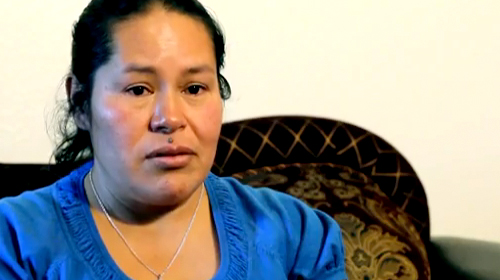
Why are so many Mexican nationals with deep family ties in the United States and strong claims to reside here lawfully instead “choosing” to be immediately expelled from the country? Because immigration enforcement authorities in Southern California routinely pressure these immigrants – some of whom have been here for decades – to surrender their right to seek legal status. Through abuse of a process known as “administrative voluntary departure,” Border Patrol and Immigration and Customs Enforcement (ICE) officers compel these immigrants to involuntarily sign summary expulsion orders. Today, the ACLU and Cooley LLP filed suit in California to challenge these endemic abuses.
From a day laborer arrested for lack of proper identification, to a worker stopped for driving without a license, to a young woman with cognitive disabilities who could not assert her own rights, numerous aspiring citizens – people whom the President has deemed part of the fabric of our great nation – are subject to coerced voluntary departure. Our lawsuit alleges that Border Patrol and ICE officers in Southern California systemically employ pressure, deception, and threats to effectively force individuals to sign for voluntary departure. These officers often tell individuals that they “have to” sign for voluntary departure and that they have “no rights.” In addition, officers systemically lie, give patently false “legal advice,” and even use pure physical force to coerce individuals to sign away their rights. Officers routinely mislead individuals into signing for voluntary departure by telling them they can easily obtain lawful status to return to the United States once in Mexico. In actuality, there are significant legal impediments to obtaining legal status from Mexico after voluntary departure. Immigration officers also refuse to let individuals contact their families or legal counsel while they are faced with the “choice” of whether or not to sign a voluntary departure form.


%3Ciframe%20allowfullscreen%3D%22%22%20frameborder%3D%220%22%20height%3D%22281%22%20src%3D%22https%3A%2F%2Fwww.youtube.com%2Fembed%2FFSjVQsYcwdk%3Fautoplay%3D1%26version%3D3%22%20width%3D%22500%22%3E%3C%2Fiframe%3E
Privacy statement. This embed will serve content from youtube.com.
If all of this sounds sadly familiar, that’s because it is. Even though it has long been clear that the U.S. Constitution requires that any waiver of rights be knowing and voluntary, in the twentieth century police officers coerced suspects – particularly African Americans – to get them to “confess” to crimes they didn’t commit. Similarly, in flagrant violation of this basic principle of fairness, immigration enforcement agencies have consistently abused their immense power and pressured vulnerable individuals to surrender their rights. In the 1980s, the predecessor to ICE, the Immigration and Naturalization Service (“INS”) was sued for detaining and removing Salvadoran asylum seekers by using coercive tactics; the lawsuit led to a permanent injunction requiring INS to provide Salvadorans accurate information about their rights. Recent reports, however, show that immigration enforcement authorities continue to perpetuate similar abuses today.
In Southern California, once a Mexican national signs a voluntary departure form, they are expelled to Mexico as soon as possible, without regard to any plausible claim to immigration relief. Many of the immigrants thus expelled have families, homes, and jobs in the United States, and few remaining connections to Mexico. Summary expulsion is devastating for these individuals and their families – and in some cases, it has had fatal consequences. Ildefonso Martinez Sanchez, for example, died while attempting to return to his wife and U.S. citizen children after an unlawful voluntary departure. Ildefonso came to the United States as a teenager, seeking a chance to pursue the American Dream. He settled in northern San Diego County, married, and had five U.S. citizen children. On a day like any other, Ildefonso left his home to get groceries for his family. During a chance encounter with a Sheriff’s deputy, he was turned over to Border Patrol because he lacked proper identification. Border Patrol agents pressured him to sign for voluntary departure and expelled him to Mexico shortly thereafter. Ildefonso died in the desert while attempting to reunite with his family in the United States.
Stories like Idefonso’s highlight the need for reform of immigration enforcement agencies’ policies and practices, which for too long have operated as if above the law. Last century’s police abuses against criminal suspects provoked landmark legal rulings and legislative reform protecting against coercive police tactics. It’s high time the same thing happens in the sphere of immigration enforcement, especially as Congress contemplates vastly expanding border enforcement resources. When so many of those deported could apply for some form of immigration relief, the core constitutional protections of due process are more important than ever. To protect and promote the essential American values of family and justice, our courts and elected officials must take action to ensure that the rights of those most vulnerable are vindicated.
Learn more about immigrants’ rights and other civil liberty issues: Sign up for breaking news alerts, follow us on Twitter, and like us on Facebook.




